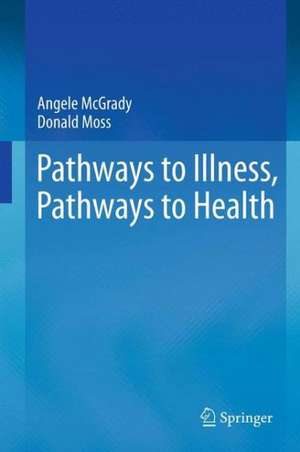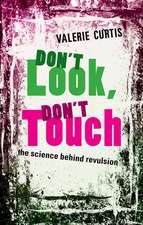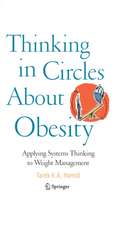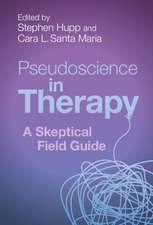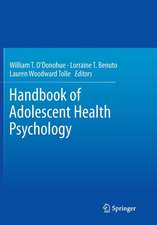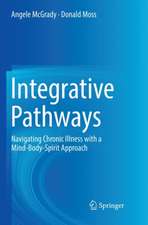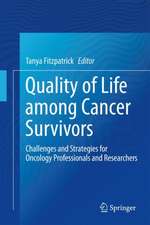Pathways to Illness, Pathways to Health
Autor Angele McGrady, Donald Mossen Limba Engleză Hardback – 7 mar 2013
For example, the section on "Applications to common illnesses: metabolic disorders of behavior: diabetes, hypertension, and hyperlipidemia"considers the confluence of genetics, behavior, and maladaptive mind body interactions to produce the metabolic syndrome. Then the personal and professional assessments are described to establish the baseline for recommending treatment while fully engaging the patient. Finally, multilevel interventions are formulated for these disorders. The plan begins with clinician guided self care recommendations to re-establish the normal rhythm of appetite and satiety. The next level of interventions consists of skill building techniques, such as relaxation and imagery. Lastly, psychotherapy and advanced applied psychophysiological interventions are detailed. Case examples are used throughout to illustrate the pathways to illness, the turning points, and the pathways to health. From the patients’ viewpoints, the pathways metaphor is a motivator. The patient is guided to understand the paths that led to illness. Subsequently, the patient becomes empowered by the pathways framework to begin to make choices that lead to health.
| Toate formatele și edițiile | Preț | Express |
|---|---|---|
| Paperback (1) | 651.74 lei 6-8 săpt. | |
| Springer – 14 apr 2015 | 651.74 lei 6-8 săpt. | |
| Hardback (1) | 783.09 lei 39-44 zile | |
| Springer – 7 mar 2013 | 783.09 lei 39-44 zile |
Preț: 783.09 lei
Preț vechi: 824.30 lei
-5% Nou
Puncte Express: 1175
Preț estimativ în valută:
149.85€ • 160.24$ • 124.94£
149.85€ • 160.24$ • 124.94£
Carte tipărită la comandă
Livrare economică 14-19 aprilie
Preluare comenzi: 021 569.72.76
Specificații
ISBN-13: 9781441913784
ISBN-10: 1441913785
Pagini: 280
Ilustrații: XIV, 263 p.
Dimensiuni: 155 x 235 x 19 mm
Greutate: 0.57 kg
Ediția:2013
Editura: Springer
Colecția Springer
Locul publicării:New York, NY, United States
ISBN-10: 1441913785
Pagini: 280
Ilustrații: XIV, 263 p.
Dimensiuni: 155 x 235 x 19 mm
Greutate: 0.57 kg
Ediția:2013
Editura: Springer
Colecția Springer
Locul publicării:New York, NY, United States
Public țintă
Professional/practitionerCuprins
Part 1: Basic Concepts of Health and Illness.- Introducing the Pathways Model.- Genetic Etiology of Illness.- Psychosocial Etiology of Illness.- Psychophysiological Etiology of Illness.- Assessment in the Pathways Model.- Interventions in the Pathways Model.- Part 2: Applications to Common Illnesses.- Substance Abuse Disorders.- Depression and Anxiety.- Diabetes and Obesity.- Hypertension and Syncope.- Headache and Back Pain.- Fibromyalgia.- Gastrointestinal Disorders.- Sleep Disorders.- Part 3: Personalizing the Path to Health and Wellness.- Simple Pathways to Health and Wellness.- Developing a Wellness Plan.- Seeking Professional Help.
Recenzii
From the reviews:
“Pathways to Illness, Pathways to Health provides a broad overview of the past research on complementary and alternative health techniques for both mental and physical illnesses. … The organization and outline of the book may provide a starting point for lifestyle coaches and alternative health care practitioners to find evidence for treatments … .” (Patrick L. Hill and Robin K. Young, PsycCRITIQUES, Vol. 59 (4), January, 2014)
“Pathways to Illness, Pathways to Health provides a broad overview of the past research on complementary and alternative health techniques for both mental and physical illnesses. … The organization and outline of the book may provide a starting point for lifestyle coaches and alternative health care practitioners to find evidence for treatments … .” (Patrick L. Hill and Robin K. Young, PsycCRITIQUES, Vol. 59 (4), January, 2014)
Notă biografică
Angele McGrady received her B.S. from Chestnut Hill College in Philadelphia, her Masters in Physiology from Michigan State University, and her Ph.D. in Biology from the University of Toledo. Later she returned to complete a Masters in Guidance and Counseling. She is a licensed Professional Clinical Counselor and is certified by the Biofeedback Certification Institute of America. Currently Dr. McGrady is a professor and Director of Medical Education in the Department of Psychiatry at the University of Toledo. Dr. McGrady’s professional activities include: Past President of the Association for Applied Psychophysiology and Biofeedback and Associate Editor of the international (Springer) journal Applied Psychophysiology and Biofeedback. Dr. McGrady lectures locally and nationally on topics related to stress and chronic illness, and biofeedback. In 1997, she was honored with the Dean’s Award for Teaching Excellence. Recently, she developed a wellness series for first year medical students. The project is funded by the David and Lura Lovell Foundation and is now in its second year. Her curriculum vita lists 55 publications and eleven book chapters. She has co-edited one book, Handbook of Mind-Body Medicine for Primary Care (Sage, 2003). In March 2000, Dr. McGrady received the Distinguished Scientist Award from the Association for Applied Psychophysiology and Biofeedback.
Donald Moss, Ph.D. is the Director of Integrative Health Studies at Saybrook Graduate School in San Francisco, and is a partner in the Psychological Services Center in Grand Haven Michigan. He is Editor of the Biofeedback Magazine, Associate Editor for the journal Applied Psychohysiology and Biofeedback and consulting Editor for the Journal of Neurotherapy, Psychophysiology Today and the Journal of Phenomenological Psychology. Dr. Moss has over 50 publications in the fields of psychophysiology, biofeedback and mind-body therapies,including an edited book (Handbook of Mind Body Medicine for Primary Care, Sage, 2003). He has given lectures and workshops on these topics throughout the world, including recent presentations at the Association for Applied Psychophysiology and Biofeedback, the International Association for Cognitive Psychotherapy, the National Autonomous University of Mexico, and the Biofeedback Foundation of Europe. He is also past president of AAPB.
Donald Moss, Ph.D. is the Director of Integrative Health Studies at Saybrook Graduate School in San Francisco, and is a partner in the Psychological Services Center in Grand Haven Michigan. He is Editor of the Biofeedback Magazine, Associate Editor for the journal Applied Psychohysiology and Biofeedback and consulting Editor for the Journal of Neurotherapy, Psychophysiology Today and the Journal of Phenomenological Psychology. Dr. Moss has over 50 publications in the fields of psychophysiology, biofeedback and mind-body therapies,including an edited book (Handbook of Mind Body Medicine for Primary Care, Sage, 2003). He has given lectures and workshops on these topics throughout the world, including recent presentations at the Association for Applied Psychophysiology and Biofeedback, the International Association for Cognitive Psychotherapy, the National Autonomous University of Mexico, and the Biofeedback Foundation of Europe. He is also past president of AAPB.
Textul de pe ultima copertă
Why is this person healthy when that one is ill?
The trained provider is well schooled in the roles of genetics, environment, lifestyle choices, and pure luck in individuals' well-being. But now a groundbreaking new book clearly identifies the turning points that lead from wellness to disease--and how patients can be re-routed back to health. Pathways to Illness, Pathways to Health is no simple metaphor but a powerful model for healing that views health and disease along a continuum, with patient and provider as partners on the journey. A rigorous evidence base pinpoints causal variables for illness (particularly stress-related disorders) that can be targets for change, and is the basis for recommended healthful behaviors and restorative therapies. Case histories illustrate a detailed ongoing assessment process and three progressive levels of intervention chosen from a variety of techniques and modalities, ranging from biofeedback and mindful breathing to cognitive-behavioral therapy and acceptance and commitment therapy. Included in the coverage:
The trained provider is well schooled in the roles of genetics, environment, lifestyle choices, and pure luck in individuals' well-being. But now a groundbreaking new book clearly identifies the turning points that lead from wellness to disease--and how patients can be re-routed back to health. Pathways to Illness, Pathways to Health is no simple metaphor but a powerful model for healing that views health and disease along a continuum, with patient and provider as partners on the journey. A rigorous evidence base pinpoints causal variables for illness (particularly stress-related disorders) that can be targets for change, and is the basis for recommended healthful behaviors and restorative therapies. Case histories illustrate a detailed ongoing assessment process and three progressive levels of intervention chosen from a variety of techniques and modalities, ranging from biofeedback and mindful breathing to cognitive-behavioral therapy and acceptance and commitment therapy. Included in the coverage:
- Genetic and psychosocial etiologies of illness.
- Psychophysiological aspects of stress.
- Guidelines for comprehensive assessment.
- The conceptual framework: interventions in the pathways model.
- Applications to common illnesses: diabetes, obesity, substance abuse, depression, anxiety, cardiovascular disease, back pain, sleep disorders, fibromyalgia, and more.
- Personalizing the path to health and wellness.
Caracteristici
Summarizes behavioral, psychological, cognitive, and genetic predispositions that lead people to illness. Emphasizes turning points that lead to health. Emphasizes the concept that the clinician guides the individual, who acts as the primary agent of change. Includes supplementary material: sn.pub/extras
